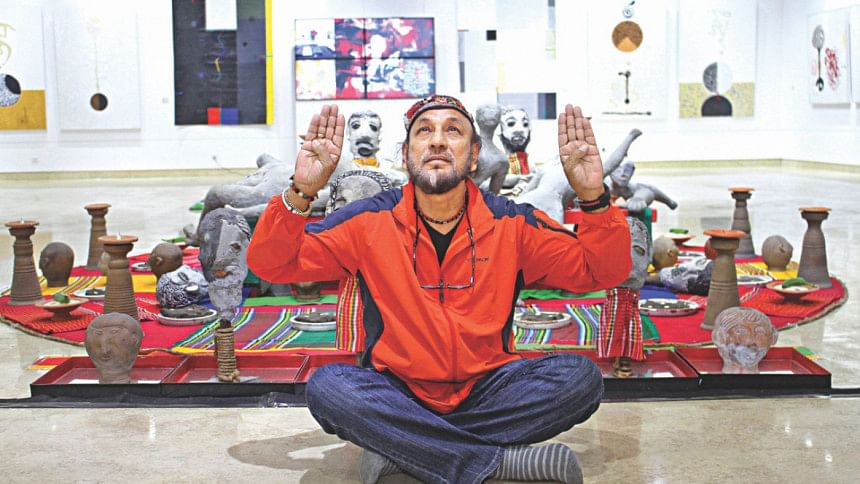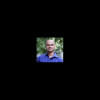Artistic Saga of Alluvial Soul, Soil and Symbol

Internationally acclaimed artist Kalidas Karmakar's 72nd solo exhibition, “Alluvial Soul, Soil and Symbol”, is on at the Nalinikanta Bhattasali Gallery of Bangladesh National Museum (BNM). The 22-day exhibition that began on January 3 features artworks echoing symbolic, abstract and semi-abstract imageries, an installation and a video art incorporating Kalidas' artistic journey for decades.
“As my paintings symbolically represent the connotations of our glorious Liberation War; various social phenomena and their perceptions; unwanted political unrest and the life sketches of the people of this part of the world, I recurrently choose the very word 'Alluvial' to title any of my solo exhibitions. The mind of every Bangalee is as soft as the alluvial clay and, at the same time as hard as the stone after that clay gets burnt with fire. This explains how we became fiercely opposed to the Pakistanis and liberated our motherland in 1971,” explained Kalidas Karmakar.
“Earlier I would do realistic works. Now with my changing artistic contemplations and conscience corresponding to my present age, I am moving towards a minimalistic approach; and that is why my artworks now tell the tales of symbols coupled with souls and soil of Bangladesh,” added the artist.
The conscience of the Liberation War is conspicuous in some of his arts and installation. The turbulent days of 1971, people's sufferings, death and destruction together with the artist's recurring subjects encapsulating the agonies and frustration of Bangladeshis in times of war and other natural and socio-political adversities in the post independent era have been articulated on large canvases.
In portrayal of the installation, the artist created six statues to signify the historic six-point charter propounded by the Father of the Nation Bangabandhu Sheikh Mujibur Rahman. The piece also showcases the bodies of the Martyred Intellectuals and the Freedom Fighters.
The artworks evoke the symbol of popular beliefs and rituals together with our time-honoured cultural elements and heritage like Gazir gaan and nakshikantha and the artistic works of weavers, goldsmith, blacksmith, potters and others.
The artist emphasises the miseries of common people with the depiction of bold brush strokes and lines, mature colours, light and shade and both symmetrical and asymmetrical compositional patterns in his works. In his use of materials and tints, he frequently goes for the bold and natural.
The art show, organised by BNM, is also an attempt to return to roots. Kalidas Karmakar has used unusual materials including alluvial clay, sand and other objects to produce the featured works which art lovers will definitely find interesting.
As a painter, Kalidas feels the responsibility to serve his country. He records time, history and incidents in urban and rural lives. His distinctive language uses canvas to protest cruelty, inequality, political chaos, poverty and violence in our daily lives.
The artist has portrayed lyrical rhythms through his pen and ink drawings while his installations evoke the sublime memories of the martyred of 1971.
Cultural Affairs Minister Asaduzzaman Noor inaugurated the exhibition as chief guest while Professor Emeritus Anisuzzaman and Farooq Sobhan, President of Bangladesh Enterprise Institute, attended the inaugural ceremony as special guests. The exhibition, opening from 9:30am to 7pm daily except Fridays (2:30pm to 7:30pm), ends on January 24. Kalidas Karmakar will present a performance art titled “Alluvial Rhythm” at the main auditorium of BNM at 5pm on January 10 with Dr. Gowher Rizvi, International Affairs Adviser to the Prime Minister, to be present as chief guest.

 For all latest news, follow The Daily Star's Google News channel.
For all latest news, follow The Daily Star's Google News channel. 








Comments